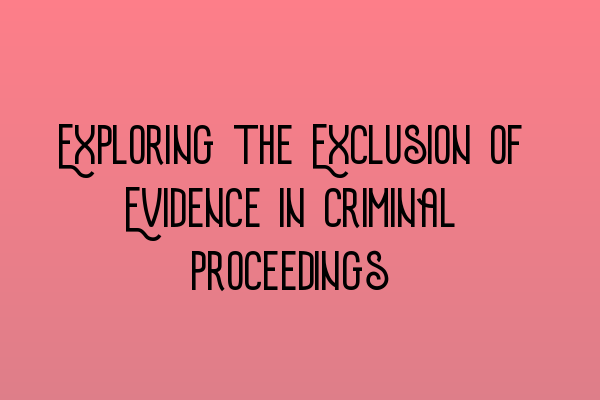Title: Exploring the Exclusion of Evidence in Criminal Proceedings: A Comprehensive Guide by SQE Criminal Law & Practice Law UK
Introduction:
Welcome to SQE Criminal Law & Practice Law UK’s comprehensive guide on the exclusion of evidence in criminal proceedings. As experienced solicitors, writers, and SEO experts, we understand the importance of exploring this crucial aspect of criminal law. In this blog post, we will delve into the various factors, rules, and considerations surrounding the exclusion of evidence, shedding light on its significance and implications.
Understanding the Exclusion of Evidence:
In criminal proceedings, the exclusion of evidence refers to the judicial act of prohibiting the admission of certain evidence during a trial. The primary rationale behind this exclusion is to maintain fairness, integrity, and trust in the criminal justice system. Excluded evidence can significantly impact the outcome of a case, potentially leading to the acquittal or conviction of an accused individual.
Grounds for Exclusion:
1. Illegally Obtained Evidence:
Evidence that has been unlawfully obtained, whether it be through a violation of an individual’s rights, improper search and seizure practices, or coerced confessions, is likely to be excluded. The court’s objective is to prevent the utilization of evidence that has been procured in violation of the law or infringing on a defendant’s constitutional rights.
2. Unreliable or Flawed Evidence:
Evidence that is deemed unreliable, fabricated, misleading, or unfairly prejudicial can be excluded. This may include hearsay evidence, testimonies from unreliable witnesses, or evidence obtained through faulty scientific methods. The court aims to maintain the integrity of the trial process by excluding evidence that could potentially mislead the jury or undermine the fairness of the proceedings.
3. Privileged Communications:
Certain communications, such as those protected by legal privilege, are generally excluded from evidence. Privileged communications encompass discussions between clients and their legal advisors, doctor-patient confidentiality, and confidential communications between spouses. The law recognizes the importance of maintaining confidentiality in these relationships, with the aim of encouraging open and honest communication.
4. Breach of Procedural Rules:
Evidence obtained through a breach of procedural rules, whether it be non-compliance with disclosure obligations, failure to adhere to proper evidential requirements, or violation of the defendant’s right to a fair trial, may be excluded. The court must ensure that the rules of procedure are followed to guarantee fairness and justice for all parties involved.
The Role of Prosecution and Defense:
Both the prosecution and defense have a responsibility to object to the admission of evidence that should be excluded. The prosecution should exercise discretion and abstain from relying on evidence that is likely to be excluded, whereas the defense should actively challenge the inclusion of questionable evidence.
The Court’s Discretion:
In most jurisdictions, the court possesses discretionary power when it comes to excluding evidence. Factors such as the importance of the evidence, its probative value, the circumstances in which it was obtained, and the potential prejudice it may cause are carefully considered. The court balances these factors to ensure a fair and just trial.
Conclusion:
The exclusion of evidence is a critical aspect of criminal proceedings, ensuring fairness, integrity, and balance in the pursuit of justice. By understanding the grounds for exclusion, the roles of the prosecution and defense, and the court’s discretionary power, we can navigate the complexities of this legal principle effectively.
At SQE Criminal Law & Practice Law UK, we are dedicated to providing you with comprehensive legal insights. We hope this guide has shed light on the exclusion of evidence in criminal proceedings, empowering you with the knowledge necessary to navigate this crucial aspect of the criminal justice system.
